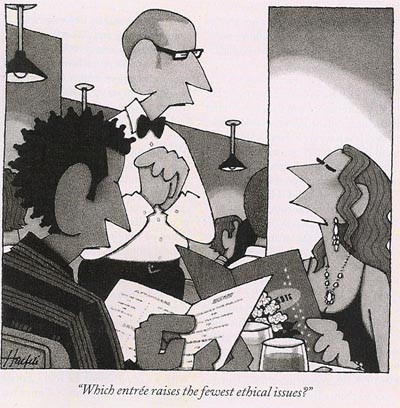Freshman Seminar: What's For Dinner?: Eating Well and
Doing Good
What's For Dinner?: Eating Well and Doing Good
Autumn 2009
When and Where:
2nd-5th Mondays of the quarter (5 October, 12 October, 19 October, 26
October), 10:00 a.m. to 11:50 a.m., in Humanities and Social Sciences
8025. Note: no meeting 28 September.
Instructor: Jonathan Cohen
(joncohenREMOVETHIS@REMOVETHISaardvark.ucsd.edu (omit text in caps, which reduces automated spam))
office: (858) 534 6812
Office hours: Tuesdays 10-11:30, in H&SS 8072 (and by
appointment; please feel free to call)
Our choices about what to eat have crucial implications for our
stomachs, the welfare of animals, the natural environment, the
arrangement of our society, our pleasure, and our health.
So a lot is hanging on our decisions about what we eat.
Moreover, these are not merely hypothetical ivory tower cases:
every one of us typically makes these decisions (or has them made on
our behalf) several times daily!
Should we, for example, become vegetarians?
Vegans?
Freegans?
What are the pros and cons of organic food?
Should we
be locavores?
Is it ethically acceptable to eat fish?
Or only some fish?
Unfortunately, these are not easy decisions.
There are many factors to consider, and they often pull in different
directions.
Moreover, while there's an huge amount of information out there that
purports to guide our decision-making about what to eat, much of it is
unreliable, confusing, comes from transparently self-interested
sources, or is otherwise suspect.
Finally, the sheer avalanche of information is overwhelming.
In this freshman seminar we'll be asking how, in the face of these
problems, a rational and ethically sensitive person should decide on
what to eat.
Issues to be discussed include the positive and negative effects of
various of our food choices on (among other things):
- (non-human) animal welfare,
- the natural environment (pesticides, pollution, carbon footprint),
- human workers in the production/distribution chain,
- our own nutrition,
- our own pleasure.
We'll organize our discussion around Peter Singer's and Jim
Mason's The Way We Eat: Why Our Food Choices Matter, Rodale,
2006.
This book is available from
the UCSD
Bookstore, amazon, and lots of other places.
Course Expectations
Students will be expected to read the assigned chapters, come to
discussion, and participate in discussion.
In addition, every student will be required to bring a written
question (maximum 4 sentences) raised by the reading to every
session after the first.
These will form the basis of the class discussion, so it is essential
that they be handed in every meeting.
All freshman seminars are graded P/NP.
You must hand in written discussion questions at every meeting (after
the first one) to receive a P in the course.
Tentative Schedule
| Date | Reading |
| 5 October | Introduction, planning; no reading |
| 12 October | Singer and Mason, intro and part I: Eating the
Standard American Diet (introduction, ch 1-5) |
| 19 October | Singer and Mason, part II: The Conscientious
Omnivores (ch 6-12) |
| 26 October | Singer and Mason, part III: The Vegans (ch
13-18) |

